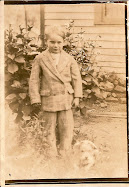[ ] After three days at Ft. Thomas, JR’ boarded a train headed for California and Camp Roberts, located about half way between Los Angles and San Francisco. The nearest city to the military reservation was Paso Robles, California. The train took four or five days to travel from Kentucky to Camp Roberts. JR’ said it seemed like a long journey but the train stopped frequently to let the soldiers get some exercise. He remembered the times they stopped at train stations where the soldiers got off but couldn’t leave the immediate area—usually to find some stronger refreshments. The enterprising local residents would wait until the soldiers boarded the train before they offered them liquor to buy—as the train was about to pull away.
“They would sell you an expensive bottle of whiskey in a brown paper bag,” he said.
“They’d run along side the train and ask for the money first then hand you the sack. I remember a Captain getting a sack with wine in it, he was so angry that he through it back at the guy,” JR’ said chuckling.
JR’ knew right away what was going to happen prior to getting back on the train, so he cut his deal for whiskey with a citizen near the train station, avoiding the last minute rush. He thought the soldier’s hurrying to get some liquor would prove very opportunistic for a scam and indeed many soldiers, including the captain, were disappointed.
“The people at the train stations knew we couldn’t go into town and I knew they’d have something to sell a soldier,” he said, “you just couldn’t wait until the last minute to get your bottle otherwise you’d never know what you’re getting,” JR’ said laughing.
skip to main |
skip to sidebar




Bloody Omaha: My Remembrances of That Day (Paperback, Fall - 2010) by James Robert Copeland, S/SGT., 5th Ranger Infantry Battalion
I remember receiving sniper fire from above in a similar scene as pictured here -- none of us thought we'd make it. I did make it and here is my story.
It begins from my childhood in West Virginia, where my family and my family's family, worked in the coal mines.
When war broke out (Pearl Harbor), I enlisted in the Army and became Army Ranger -- fighting that fateful day, on the bloodiest beach, June 6th, 1944.
As a home health aid my wife Linda discovered James Robert Copeland. Linda and I were surprised with his energy, his vitality and his story. It didn't take much conversation to convince him of the importance of recording his story for posterity. We had several interviews over the past year and each time JR (as Ranger Copeland likes to be called), reminded me he felt his time was running out. He wanted me to hurry in my writing so he could see the finished book.
JR Copeland will be 89 years old this year. There has never been a time when I didn't find him cordial, informative and quite lucid in his conversation. Hopefully JR will see his story published -- this man is a magnanimous individual, besides being a war hero. I hope my writing does justice to his great story.
--garry m graves, biographer
ShareThis
Buy a signed 'Bloody Omaha' paperback from author, James Robert Copeland - only, $11.95, shipping is free. Click here for further details.
$.99 eBook - Click Left Ad
Picture of JR at 8 years old. His best friend at his foot -- Chigger, who was his 'first dog.'

Pictures of JR's life and times.
Ranger Copeland with Bernie, 'his last dog.'

Follow This Blog

Over 9000 left behind at Normandy.

Followers -- Please 'Follow' my blog for book updates and sample snippets.
Facebook Badge
Copyright © Garry M. Graves - 2010



